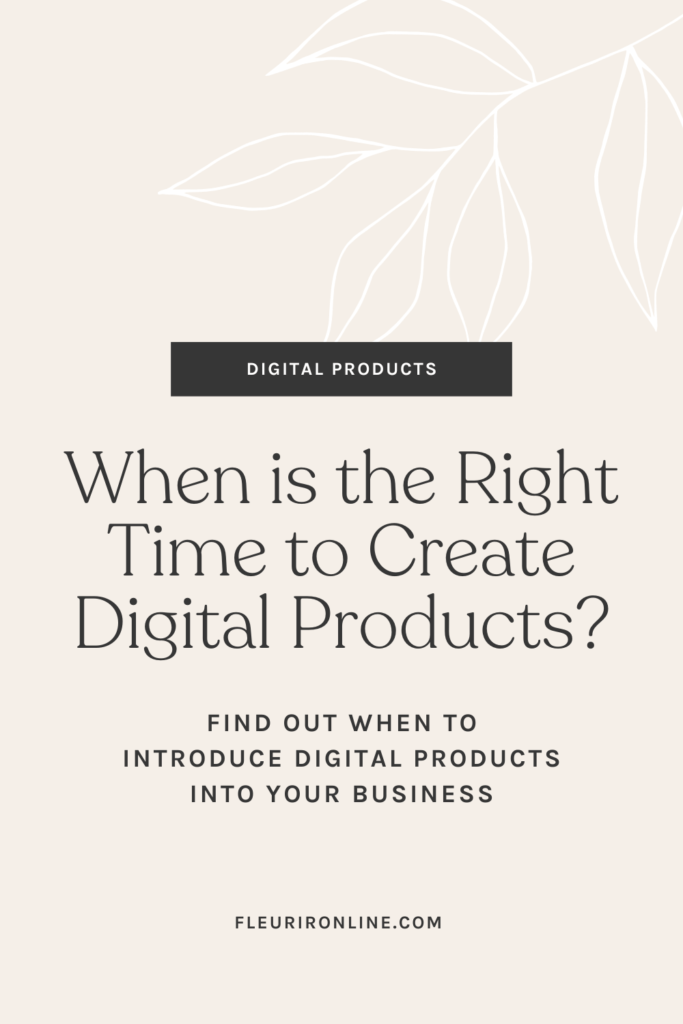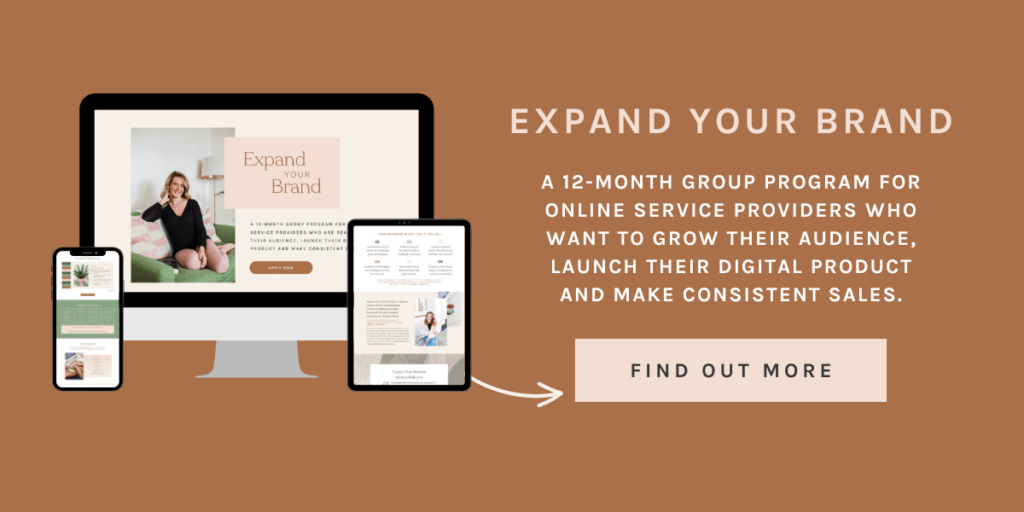This is the third in a series of 10 podcast episodes/blog posts all about digital products. Check out the other posts in this series below.
1. How to Create Digital Products That People Actually Want
2. 8 Digital Product Ideas for Your Service-Based Business
3. When is the Right Time to Create Digital Products?
4. How to Find the Time to Create Digital Products
5. 5 Ways to Validate Your Idea for Your Digital Product
6. 5 Limiting Beliefs Keeping You From Creating Your Digital Product
7. The Tools You Need to Sell Digital Products
8. Digital Products vs Courses – Which Should You Create?
9. Your Digital Product Launch Questions Answered
10. Digital Products Not Selling? Here’s What to do
In the third episode of the series, I share with you when exactly is the right time to create digital products. I’ll also be sharing with you a mistake I made when creating my Showit template shop so that you can hopefully avoid doing the same.

Listen to this episode
Listen to this episode and subscribe using your favourite podcast app!
Apple Podcasts | Spotify
So is there a right time to create a digital product? Let me start by saying that as with anything in business, there are no hard and fast rules however I am going to provide you with recommendations based on my experience.
My very first digital product was a 50-page workbook that I created about a year into my business. It was actually something that I hadn’t planned to create. I’d originally designed it as a freebie to grow my email list but my business coach at the time quite rightly told me that it was way to much to give away for free and that I should use it as a low-cost offer and build it into my email funnel as a tripwire. At this point in time I had absolutely no idea what a tripwire was despite being in marketing for 10 years because we didn’t use tripwire offers in the corporate world. I went away and did my research and a short while later had a digital product built into my email funnel that I still use to this day. My tripwire funnel converts at around 8-10% meaning that for every 100 people I get on my email list, I get between 8-10 sales on average.
My Showit template shop was an idea that I had for over a year before I actually got round to doing it and by the time I really got serious about working on it, I was booked out with branding and web design clients meaning I had no free time to work on building my digital products. I had a couple of options at this point. I could have hired a contractor to work alongside me on these projects. I could have worked on my template shop during the evenings and weekends but I had a young family so that wasn’t really an option or the third option which is the one I chose was to block out a period of about 6-weeks in my calendar where I took on no new 1:1 clients and I focused solely on creating and launching the shop.
Now, none of these options are the right or wrong ones, it was simply about what I felt was right for me and my business at the time. However, if I’d not sat and procrastinated on the idea for 12 months and actually created a plan to get it done, I could have managed my time to ensure I had time to work on both client work and my digital products.
Start working on your digital products before you get fully booked
I feel like there is so much advice out there that tells you to focus on your high ticket offers first and whilst I do agree with it, I also 100% believe that you should start working on your digital products before you get to the point where you are fully booked because when you’re fully booked with clients, you’re going to struggle to find the time.
The type of digital product you create can also have an impact on when you create it in your business.
Test the waters with a smaller digital product
Creating an ebook is something that shouldn’t take too long to create so there is absolutely nothing wrong with working on this once you have booked your first few clients. The same goes for something like a masterclass or mini-course. Essentially any digital products that aren’t going to take you too long to create are the best things to start with. I wouldn’t necessarily recommend diving straight into creating a huge signature course or group program without testing the waters with a smaller product first.
Another reason not to work on creating a signature course early on in your business is that usually it takes a little while for you to figure out what your process or framework is for your offer. It’s far easier to create an online course once you have this figured out.
Determine your goals for your business
Another factor to consider when asking yourself when is the right time to work on your digital products is what your goals are for your business and how much money you need to be bringing in each month. Maybe your salary is one that you rely on within your personal situation and if that’s the case, you’re going to need to be earning money from the very beginning meaning focusing on higher ticket 1:1 clients needs to be your primary focus.
Perhaps you are building your business alongside a 9-5 or part-time job so you don’t necessarily need to think too much about income in the early days and you know that you want to build a business that’s split between 1:1 work and digital products. You could then choose to work on your digital products much earlier on.
Turn your email subscribers into warm leads with a low-cost offer
So what about audience numbers? Does it matter how many people you have on your email list before launching your first digital product? Well that depends. If you’re going to use your low-ticket offer as part of your email funnel like I have, then I would start as soon as you can. The sooner you can start turning email subscribers into customers and building a list of warm leads, the better.
The other thing to mention about the number of people in your audience is that yes, whilst the digital product business model is a numbers game, it’s about how warm and engaged your audience is. You could have 3000 people in your audience but if they are not the right type of clients or they are not highly engaged, it doesn’t really mean much. You’re much better off having an audience of 500 people that are really warm than 3000 that aren’t.
So how do you measure how warm and engaged your audience is? Essentially it comes down to whether you are getting engagement on your content. Are you getting replies to your emails? Are people sending you DMs about your latest podcast episode? This is the best way to truly know how engaged your audience are with you and your business.
I know that something that would have helped me greatly when launching my Showit template shop was having a mentor who had been there and already walked the steps before me. Someone to guide me and to help me avoid making the same mistakes they did. Someone to keep me accountable and on track. This is why I created Expand Your Brand, a 12-month high-touch group program for done-for-you service providers who want to expand their impact and income and ultimately have more freedom in their business. Find out more about Expand Your Brand and if it feels like a good fit for you, complete your application and I’ll be touch.
Be sure to check out the other posts in this series. Here’s a reminder of them again.
1. How to Create Digital Products That People Actually Want
2. 8 Digital Product Ideas for Your Service-Based Business
3. When is the Right Time to Create Digital Products?
4. How to Find the Time to Create Digital Products
5. 5 Ways to Validate Your Idea for Your Digital Product
6. 5 Limiting Beliefs Keeping You From Creating Your Digital Product
7. The Tools You Need to Sell Digital Products
8. Digital Products vs Courses – Which Should You Create?
9. Your Digital Product Launch Questions Answered
10. Digital Products Not Selling? Here’s What to do
If you’re looking for support, accountability and guidance in building digital products into your business, be sure to check out Expand Your Brand, my 12-month high-touch group program for online service providers who want to grow their audience, launch their digital product and make consistent sales.




